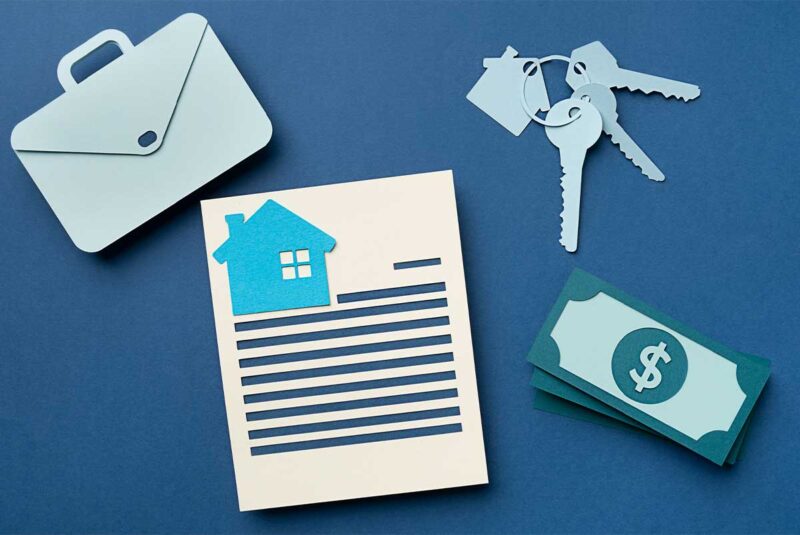Ready To Buy a Home?
Get Approved to Buy a Home
Rocket Mortgage® lets you get to house hunting sooner.
Included in every great home sale agreement is a great mortgage contingency clause. If you’re like most of the home buying population, you’re probably getting a mortgage to buy a home.
Because there’s no guarantee that you will qualify for a mortgage, adding a mortgage contingency clause to a real estate contract will protect you in case you apply for a mortgage but don’t qualify for the loan.
The mortgage contingency (aka loan contingency or financing contingency) is a clause that gets added to the real estate purchase agreement. The clause gives home buyers a set time frame to secure a mortgage loan.
If the buyer can’t get the loan during that time frame, the buyer can back out of the sale without any legal repercussions, and they can get their earnest money deposit back.
Mortgage contingencies are important. Learn more about how they work, how long they last and all of the important details you’ll need to know.
How Does a Mortgage Contingency Work?
Buying a home isn’t as simple as handing the seller a check and calling it a day. If you want to buy a home, the first thing you have to do is make an offer to the seller.
A mortgage contingency comes in handy when you know you’ll be taking out a loan for the home, but you haven’t qualified yet. This type of contingency can also be a helpful tool when you’re struggling with your finances, and you’re unsure about your chances of getting approved for a loan.
If you think you’ll need a mortgage contingency, work with your real estate agent to add the clause to your offer to purchase (aka your purchase agreement). Think of the clause as a safety net. Adding it will allow you to walk away from the deal with no penalties.
After both the buyer and seller sign the purchase agreement, the buyer will make an earnest money deposit, and the seller will take their house off the market.
Elements of a Mortgage Contingency Clause
A mortgage contingency is a carefully crafted clause (sometimes more than one clause) that both the seller and buyer must agree on.
The key components of a mortgage contingency clause include:
- Loan type: The buyer and seller must agree on the type of loan the buyer will get (conventional, FHA, VA, etc.), so the buyer can move ahead with the closing process.
- Loan amount: It specifies how much money the buyer must be approved for.
- Interest rate: The buyer must indicate the maximum interest rate they will accept on the loan. If the buyer gets approved but the interest rate is above their max, they can walk away.
- Origination points (fees): The number of origination points or fees the buyer will pay to get the loan.
- Deadline: The end date of the mortgage contingency period.
How Long Does a Contingency Contract Last?
Most real estate purchase agreements last around 30 — 60 days. The buyer will have that long to qualify for a loan.
If the buyer can’t secure a loan by the end of the mortgage contingency period, they can ask the seller for an extension. If the seller doesn’t give the buyer an extension, the buyer has two choices: back out of the deal or move ahead with the purchase without the contingency.
If a buyer decides to try buying the home without the contingency clause, they’re risking losing their earnest money deposit and/or paying penalties if they don’t close on the house.
Reasons To Waive a Mortgage Contingency
A mortgage contingency can be super helpful to include in most real estate agreements, but they aren’t always essential – and some buyers may opt to waive it.
Some buyers may decide to waive the contingency because:
- They plan on buying the house with cash.
- It’s a seller’s market, and the seller is juggling several offers at once. The seller might ask buyers to leave the contingency out so they can close on the sale faster.
- The buyer really, really wants the house, and they’re worried that the seller will reject their offer if they include a mortgage contingency.
Warning: Waiving the mortgage contingency can be risky. If this clause isn’t in your purchase agreement and your mortgage application falls through, you’ll lose your earnest money deposit, and you could be responsible for additional fees.
Other Types of Real Estate Contingency Clauses
Several other contingencies can be added to a purchase offer in addition to the mortgage contingency. Some of the most common ones include:
Appraisal contingency
An appraisal contingency says that the house the buyer is interested in must be valued at a minimum, specified amount based on the sales of similar homes in the area.
If the house is appraised for less than the sale price, the buyer can back out of the sale and get their earnest money deposit refunded.
Home sale contingency
Sometimes a buyer needs to sell a home so they can afford to buy a new one. When that’s the case, the buyer will include a home sale contingency in their offer. If they can’t sell their home before the deadline, they can back out of the sale.
Inspection contingency
With an inspection contingency, a buyer will request a professional inspection of the home within a specific time frame.
The inspection gives the buyer vital information about the state of the home and allows them to negotiate on repairs or the sale price with the seller.
Major issues with the house – like electrical, roofing problems or plumbing – can get very expensive very quickly. The buyer can either renegotiate the sale price or figure out the next steps with the seller.
If the seller doesn’t want to negotiate, the buyer may need to walk away from the deal with their earnest money firmly in hand.
Title contingency
The seller needs to be able to transfer the property title to the buyer without any liens on it. (FYI: A lien is a legal claim a lender or third parties, like a contractor or family member, has on a piece of property.) If the seller can’t transfer the title free and clear, the buyer can back out of the sale.
Last Tips on Mortgage Contingencies
It’s fairly simple to get a real estate professional to add a mortgage contingency to a purchase agreement, but is it the right move? Adding the contingency – or waiving it – is a strategy that could get you the home or leave you with no new home, no earnest money deposit and possible legal fees. Work with your real estate agent to figure out the best move for you.
Get approved to buy a home.
Rocket Mortgage® lets you get to house hunting sooner.
The Short Version
- A mortgage contingency is a clause added to a purchase agreement to protect the buyer in case they can’t secure a loan
- If the buyer is denied a loan, they can back out of the deal without any legal penalties, and they can get their earnest money deposit back
- A mortgage contingency contains important details, including the buyer’s loan type, interest rate limit and the contingency period’s deadline




